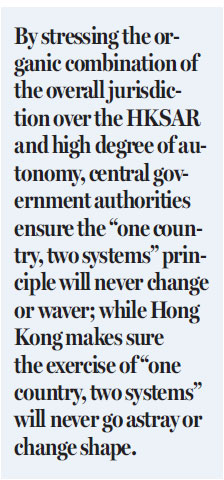Muddle on founding principle cleared up

Critical issue with much-misunderstood policy is relationship between central government and SAR, Xiao Ping explains
The relationship between "one country" and "two systems" is the core of the "one country, two systems" principle. Many social disharmonies that Hong Kong has experienced since the founding of the special administrative region under China's sovereign rule can be traced to failure to straighten that crucial relationship. Such confrontations caused by misunderstanding of "one country, two systems" took place over the central government's overall jurisdiction over the Hong Kong SAR, interpretation of the Basic Law by the National People's Congress Standing Committee, the NPCSC decision issued on Aug 31, 2014 regarding the method of selecting the chief executive of the HKSAR by universal suffrage, national education and the political system on the Chinese mainland. Some Hong Kong residents cannot comprehend these matters and therefore refuse to accept Hong Kong's constitutional reality all because they got the relationship between "one country" and "two systems" wrong in the first place.

The central government has been well aware of this problem all along. People who follow Hong Kong affairs intently should have no difficulty noticing the crucial relationship is the one topic central government authorities have emphasized more than any other issue. General Secretary Xi Jinping's report to the 19th National Congress of the Communist Party of China discusses Hong Kong in three chapters; all are linked to the crucial relationship. By stressing the organic combination of the overall jurisdiction over the HKSAR and high degree of autonomy, central government authorities ensure the "one country, two systems" principle will never change or waver; while Hong Kong makes sure the exercise of "one country, two systems" will never go astray or change shape. It also reiterates the resolve to maintain long-term prosperity and stability in Hong Kong and Macao as well as requiring the two SARs to fulfill their constitutional obligation of safeguarding the country's sovereignty, security and development interests. It states clearly the central government supports the two SARs to integrate their own development into the overall development of the nation and hopes Hong Kong and Macao compatriots will build up their sense of national belonging and patriotism, share the historic responsibility of contributing to the nation's rejuvenation as well as the pride of a prosperous nation.
An unmistakable fact is that, although the HKSAR enjoys a high degree of autonomy, it has been a part of the country's governing system since it was founded 20 years ago. From this point of view the relationship between "one country" and "two systems" is essentially the relationship between the central government's overall jurisdiction over the HKSAR and the latter's high degree of autonomy. Rejecting or resisting central authorities' overall jurisdiction over Hong Kong means setting "two systems" against and even on top of "one country", hence the mistaken concept on authority and autonomy.
The people of Hong Kong should truly understand why Xi's report puts so much emphasis on the central government's overall jurisdiction over the HKSAR. Sovereignty is demonstrated by jurisdiction, without which the power vested in the central government by the Basic Law would be void and high degree of autonomy pointless. And what's the point of resuming sovereign rule over Hong Kong in the first place if the central government does not exercise overall jurisdiction?
The author is a veteran current affairs commentator.
(HK Edition 10/27/2017 page12)
Today's Top News
- President Xi to deliver New Year's message to ring in 2026
- Xi's diplomacy in 2025: Shedding light on a world at crossroads
- China to apply lower import tariff rates to unleash market potential
- China proves to be active and reliable mediator
- Three-party talks help to restore peace
- Huangyan coral reefs healthy, says report






























